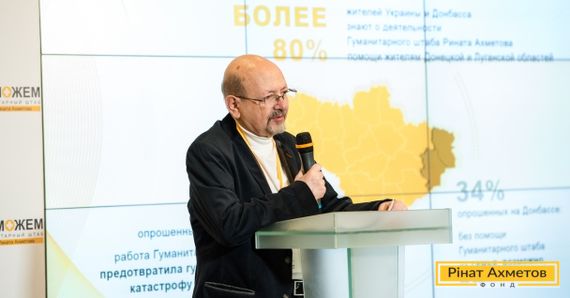International experts: there are real problems and real assistance in Donbas

Residents of Donetsk and Luhansk regions need assistance, said General Director of the Kiev International Institute of Sociology (KIIS) Vladimir Paniotto at the "Donbas and Civilians" reporting event of the Rinat Akhmetov Humanitarian Center. According to Paniotto, this opinion is shared by 88% of the polled residents of Donbas and almost 52% of all Ukrainians, who are also convinced that the Humanitarian Center provides the greatest support to the population of the region.
"For residents of the Donbas in general, food and medication are the most needed. Then there are household goods, baby food and clothes", said Paniotto.
Alexander Hug, first deputy chairman of the OSCE Special Monitoring Mission, said that the civilian population suffers primarily because of the conflict in Donbas.
"The situation in the east of the country remains difficult for civilians on both sides of the demarcation line. And here is an important thing! The conflict has an impact on the life of real people with real needs, which must be recognized and satisfied. The needs of these people should be in the first place", Hug said.
With the outbreak of armed conflict, a large number of people were forced to leave their homes and move to towns and villages away from combat operations. Many displaced settlers did not want to leave far from their homes and settled in the controlled territory of Donetsk and Luhansk regions or adjacent regions. This was told by Noel Calhoun, deputy head of the United Nations Agency for Refugees in Ukraine: "The Ministry of Social Policy says that there are now 1.5 million displaced persons in Ukraine. That's a lot! Their needs are different. There are people who could adapt, start a business. And what is pleasing: the number of people who are already employed increases with each quarter. But that does not mean that everything is all right. There are a large number of people, for whom it is very difficult to integrate: people with disabilities, pensioners, single mothers. They need support".
However, the most difficult situation, according to Noel Calhoun, is at the frontline and on the uncontrolled territories of the Donbas.
"When I visit these villages that are located along the conflict line, I'm surprised! There is nothing. Neither education, nor access to medicine, nor even a shop where you can buy bread. But people stay there", says Calhoun. "I talked to one man and was surprised, because even his family lives in another place: "Why did you stay?" And he said: "Look at my house. My father built this house. This house has 38 thousand bricks, and my father touched each of these bricks. Do you think I will leave this?"
Ivan Bochorishvili, deputy head of the UN Office for the Coordination of Humanitarian Affairs in Ukraine, mentioned the disappointing statistics. Today, two hundred thousand people live along the demarcation line in the Donbas. Almost every day civilians are subjected to shelling, and their houses are being destroyed. And the total number of victims of the conflict in Donbas is comparable to the population of a small country.
"There are 4.4 million people who suffered from the conflict. Around 3.4 million of them need humanitarian assistance", Bochorishvili said. "Very many of the people affected are over 60 years old, so we sometimes call it the "oldest" conflict in Ukraine. Humanitarian needs are considerable".
Bochorishvili told that about 2500 people were lost in Donbas from the beginning of the conflict.
Many times, I heard that this is a frozen conflict, and I absolutely do not agree with this. This is a very active and a very hot conflict in the East of Ukraine. Another thing why this situation is sad is that every day we see that about a million people cross the demarcation line to receive pensions", Bochorishvili said.
The experts note that in such conditions, ordinary civilians are in dire need of assistance.
"According to the respondents' estimates, the Rinat Akhmetov Center provides more and more assistance to the residents of Donbas. More than half of the respondents in Ukraine believe that the work of the Center prevented humanitarian disaster in the Donbas, and 34% of the polled residents in Donbas state that without the assistance of the Center, their family might not have survived", said Vladimir Paniotto, general manager of the KIIS.



